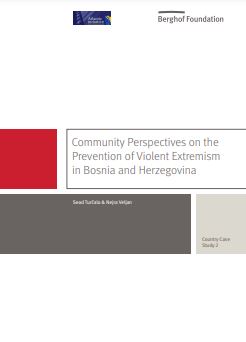Community Perspectives on the Prevention of Violent Extremism in Bosnia and Herzegovina
Community Perspectives on the Prevention of Violent Extremism in Bosnia and Herzegovina
Author(s): Nejra Veljan, Sead Turčalo
Subject(s): Islam studies, Security and defense, Studies in violence and power
Published by: Atlantska inicijativa: Udruženje za promicanje euroatlantskih integracija BiH
Keywords: BiH; violence; extremism; prevention; community perspective;
Summary/Abstract: The purpose of this research was to identify common and distinct factors of resilience or vulnerability to violent extremism in Bosnian communities as well as the influence of key actors on those factors. Cantons selected as case studies had the highest number of parajamaats and foreign fighter departures, such as Sarajevo Canton (SC) and Zenica-Doboj Canton (ZDC), or had no parajamaats or departures, such as Bosnian-Podrinje Canton (BPC). The research sought to answer three main questions: 1) What are key factors of community resilience or vulnerability, and what factors are linked to the development of violent extremist beliefs by individuals and groups and the choice to join foreign violent extremist groups? 2) Which key actors influence community vulnerability or resilience to violent extremism, and how do they shape such dynamics? 3) What is the impact of existing PVE programmes and initiatives in BiH on factors of community vulnerability or resilience to violent extremism? Researchers also wanted to determine: What are the primary entry points for PVE programming and response in BiH? And what crossover exists between PVE activities and peacebuilding and reconciliation efforts in BiH? This research identified several factors and actors that contribute to the degree to which certain communities in BiH have been affected or unaffected by radicalisation. The history of the 1992–1995 war has especially played a decisive role in shaping post-conflict radicalisation processes. This is true both in terms of how wartime actors and activities sowed the seeds of the Salafist movement in BiH and how wartime networks in certain communities increased the likelihood of investment by specific foreign actors in the post-war period. While researchers found that all these communities share some characteristics, including a lack of trust in institutions and a sense of uncertainty about the future, the main differences between affected and unaffected communities are linked to the war.
Series: Atlantska inicijativa - Policy Paper
- Page Count: 33
- Publication Year: 2018
- Language: English
- Introduction
- Content File-PDF

